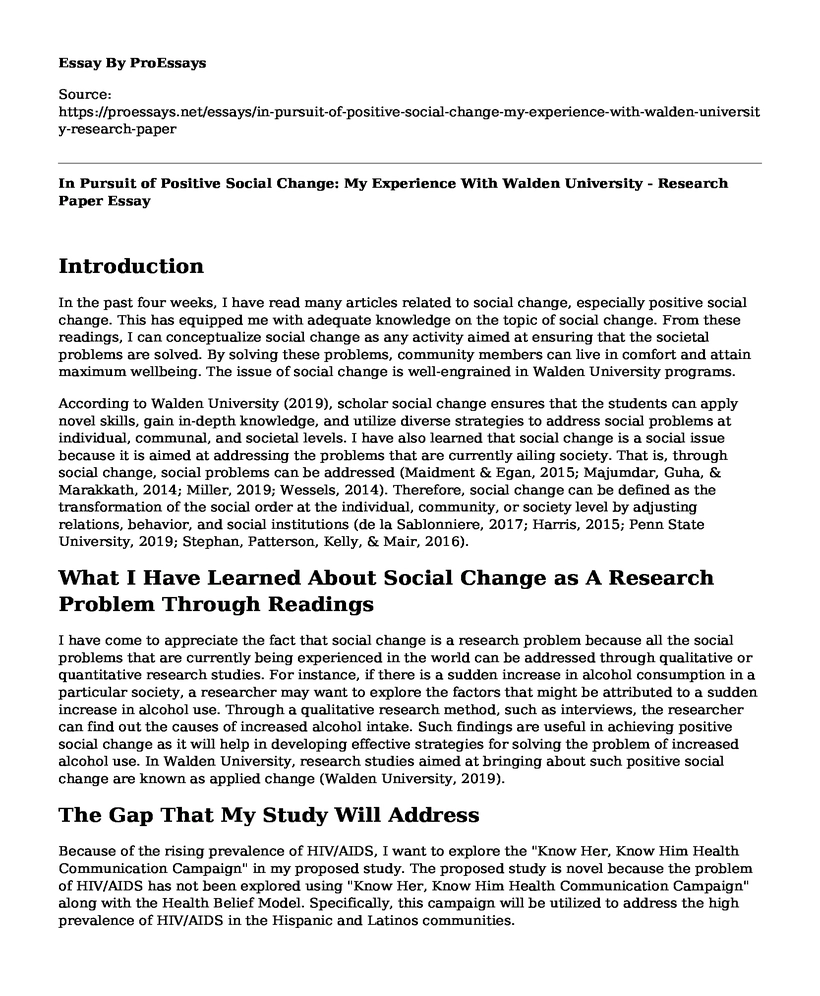Introduction
In the past four weeks, I have read many articles related to social change, especially positive social change. This has equipped me with adequate knowledge on the topic of social change. From these readings, I can conceptualize social change as any activity aimed at ensuring that the societal problems are solved. By solving these problems, community members can live in comfort and attain maximum wellbeing. The issue of social change is well-engrained in Walden University programs.
According to Walden University (2019), scholar social change ensures that the students can apply novel skills, gain in-depth knowledge, and utilize diverse strategies to address social problems at individual, communal, and societal levels. I have also learned that social change is a social issue because it is aimed at addressing the problems that are currently ailing society. That is, through social change, social problems can be addressed (Maidment & Egan, 2015; Majumdar, Guha, & Marakkath, 2014; Miller, 2019; Wessels, 2014). Therefore, social change can be defined as the transformation of the social order at the individual, community, or society level by adjusting relations, behavior, and social institutions (de la Sablonniere, 2017; Harris, 2015; Penn State University, 2019; Stephan, Patterson, Kelly, & Mair, 2016).
What I Have Learned About Social Change as A Research Problem Through Readings
I have come to appreciate the fact that social change is a research problem because all the social problems that are currently being experienced in the world can be addressed through qualitative or quantitative research studies. For instance, if there is a sudden increase in alcohol consumption in a particular society, a researcher may want to explore the factors that might be attributed to a sudden increase in alcohol use. Through a qualitative research method, such as interviews, the researcher can find out the causes of increased alcohol intake. Such findings are useful in achieving positive social change as it will help in developing effective strategies for solving the problem of increased alcohol use. In Walden University, research studies aimed at bringing about such positive social change are known as applied change (Walden University, 2019).
The Gap That My Study Will Address
Because of the rising prevalence of HIV/AIDS, I want to explore the "Know Her, Know Him Health Communication Campaign" in my proposed study. The proposed study is novel because the problem of HIV/AIDS has not been explored using "Know Her, Know Him Health Communication Campaign" along with the Health Belief Model. Specifically, this campaign will be utilized to address the high prevalence of HIV/AIDS in the Hispanic and Latinos communities.
Purpose Statement That Can Be Derived From the Research Gap
The following purpose statement will guide the proposed study: The study will employ "Know Her, Know Him Health Communication Campaign" and Health Belief Model to address the high prevalence of HIV/AIDS in the Hispanic and the Latinos communities. Following this purpose statement, I want to state that to Walden graduate students; social change means solving societal issues or problems by utilizing robust qualitative or quantitative research methods. By addressing various social issues through research, a positive social change is achieved in society. That is, solving such problems will help to improve the lives of the members of the society.
References
de la Sablonniere, R. (2017). Toward a psychology of social change: a typology of social change. Retrieved from https://www.frontiersin.org/articles/10.3389/fpsyg.2017.00397/full
Harris, R. (2015). The impact of research on development policy and practice: this much we know. In A. Chib, J. May, & R. Barrantes (Eds.), Impact of Information Society Research in the Global South (pp. 21-43). https://doi.org/10.1007/978-981-287-381-1_2
Maidment, J., & Egan, R. (2015). Practice skills in social work and welfare: more than just common sense. Crows Nest, New South Wales: Allen & Unwin.
Majumdar, S., Guha, S., & Marakkath, N. (2014). Technology and innovation for social change. New York, NY: Springer.
Miller, M. T. (Ed.). (2019). Exploring the technological, societal, and institutional dimensions of college student activism. Hershey, Pennsylvania: IGI Global.
Walden University. (2019). Scholars of change. Retrieved from https://www.waldenu.edu/about/social-change/scholars-of-change
Walden University. (2019). Social change. Retrieved from https://www.waldenu.edu/about/social-change
Stephan, U., Patterson, M., Kelly, C., & Mair, J. (2016). Organizations driving positive social change: a review and an integrative framework of change processes. Journal of Management, 42(5), 1250-1281. https://doi.org/10.1177/0149206316633268
Penn State University. (2019). Social Change in the Society. Retrieved from https://sites.psu.edu/aspsy/2017/04/11/social-change-in-the-society/
Wessels, B. (2014). Exploring social change: process and context. London, UK: Macmillan International Higher Education.
Cite this page
In Pursuit of Positive Social Change: My Experience With Walden University - Research Paper. (2023, Jan 16). Retrieved from https://proessays.net/essays/in-pursuit-of-positive-social-change-my-experience-with-walden-university-research-paper
If you are the original author of this essay and no longer wish to have it published on the ProEssays website, please click below to request its removal:
- Essay Example: Evaluation of Brent Staples' Just Walk on By
- Challenges Facing Interracial Marriages Essay
- Social Work Journal: Supervising Others Paper Example
- Should Sex Offenders Have to Register Essay Example
- Prejudice and Discrimination Representation in Art Paper Example
- Essay Sample on Native American Women: Overcoming Unreported Challenges
- Counterterrorism: Exploring Alternatives to Coercive Approaches - Essay Sample







